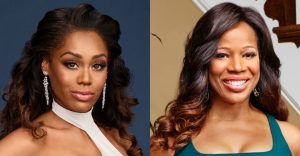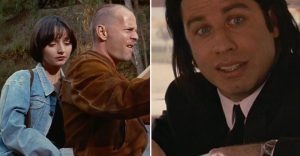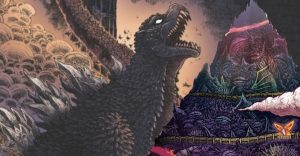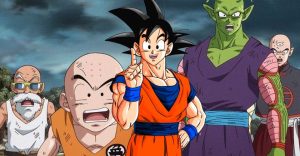True Detective: 10 Rust Cohle Quotes We Still Don’t Understand

True Detective started off with a bang, and the credit goes to its lead characters whose complex personalities made it a show to watch. Rust Cohle was the breakout character in the first season, as fans took to his introspective words that rang the truth aloud in real world situations.
However, since Cohle was always so mysterious with the way he spoke, most people don’t know what he meant in those particular scenes; this lasts to this day as well. We’ve compiled 10 quotes fans have a hard time deciphering, and have made our own interpretations over what Cohle meant. If you want to uncover the meaning behind these words, then you need to check out this list.
10 “Someone once told me time is a flat circle. Everything we’ve ever done or will do, we’re gonna do over and over and over again.”

Here, Cohle seemed to be totally into nihilistic territory, as he displayed complete dissatisfaction with the way of life. The context of the scene had the older Cohle narrate this while we saw the younger version going ahead with his job.
What there is to understand here is that, through Cohle, we were being told that our attempts at making a difference in this world are futile. No matter what you try to do different, either to make amends or to right any wrongs, it is for naught since time guarantees that things get ruined once more. In this way, there’s no point in trying in the first place.
9 “People incapable of guilt, usually do have a good time.”

It takes a minute for one to get what Cohle was saying here, only to realize this was a rather straightforward quote to begin with. People don’t get the meaning behind Cohle’s words since it was uttered quite fast and even reading it takes a little analyzing.
What the show wanted to tell us here was that Hart wasn’t one to be admired, as he had Cohle a bit on edge during this scene and you’d be inclined to go with Hart’s argument. As viewers of the show will know, Hart was routinely unfaithful to his wife, which led to Cohle subtly telling Hart the latter’s “good time” was possible because he had no guilt, according to Cohle.
8 “The world needs bad men. We keep other bad men from the door.”

This has you scratching your head due to its many interpretations. In this scene, Hart was feeling the burden of juggling two women at a time – one of them being his wife – and tried to squeeze this into conversation with Cohle; asking if he thought Hart was a bad man.
In response, Cohle claimed that the world needed bad men, which implied that he considered Hart and himself both to be bad. He then tied the twist further by stating they kept other bad men from the door. The interpretations here are that Cohle considered their version of bad to be less extreme than men like killers, or that Cohle was just avoiding confirming Hart’s indecisiveness of being a bad man.
7 “I contemplate the moment in the garden, the idea of allowing your own crucifixion.”

Following this quote, Cohle went on something of a tirade of nihilistic words, and threw Hart off with his continuous remarks against the concept of daily life. In order to gain somewhat of a context of this saying, you need to listen carefully to the whole conversation.
Basically, what we can figure out, is that Cohle didn’t care for everyday niceties, not when it was just a construct made by humans. You get the sense that Cohle is just waiting for his life to be over, so that he can finally uncover what is behind every thing we see in the world. In order to remind himself of that, he kept a cross in his apartment despite not being a Christian.
6 “There is no such thing as forgiveness. People just have short memories.”

The way Cohle says things with such absolute authority makes you wonder if his ideals are worth taking a look into. Case in point is this one about forgiveness, where Cohle claimed that nobody ever could be a forgiving person in, and granting forgiveness was simply a case of bad memory.
What we don’t understand here aren’t Cohle’s words, but the idea that he might be right. You make a big retrospection and wonder if every time you have forgiven someone, if it was because you truly did move past the issue, or if time had clouded your initial judgment.
5 “Death created time to grow the things that it would kill.”

This is an extension of the first quote, and one that makes life seem even more bleak than Cohle has already led us to believe. Again, it’s not that we don’t understand what Cohle’s saying, but that it just might true. Cohle felt that misery was something that was inevitable, since time would ensure that everything was turned into sadness.
By applying this logic, one reaches the conclusion that Death is responsible for the way time flows. Had life been the focal point of our existence, then we’d have seen our days breeze by; it’s because Death pulls the strings that we’re made to live in the disappointment of reality. However, there’s no proof that what Cohle said is the complete truth.
4 “Of course I’m dangerous. I’m police. I can do terrible things to people with impunity.”

Police have been known to be brutal in many cases over their existence, and a majority of these people have been let go because they supposedly act within the law. Rust Cohle understood where these people were coming from, and said the truth out loud.
What viewers get confused with, though, is whether Cohle meant he would be applying his power from the force in a situation he found desirable. In this scene, Cohle turned down a proposition from a woman since he found her unappealing, but he did acknowledge her claim that he was dangerous, as being police meant he could do anything and be shielded by the law. But was he planning on following through with this abuse of power?
3 “I don’t think men can love.”

In the same conversation where Hart and Cohle discuss whether they are bad men, or at least as bad as the men they hunted, they first touched upon the topic of love. Cohle’s outlook here was that love was an emotion men never had it in them to feel in the first place.
In this matter, we’re confused why Cohle would think that since there are many examples out there where men have shown to love truly and completely. Our conclusion is that Cohle was once more displaying his pessimistic tendencies and choosing to go with the weaker side of men rather than the stronger aspects.
2 “Well, if the common good has got to make up fairy tales, then it’s not good for anybody.”

Pessimism these days takes the form of atheism, and Cohle would be considered a pioneer for these people seeing as he was such a skeptic back in 1995. In this scene, Cohle looked down upon people of religion, and branded their beliefs as fairy tales that were no good.
However, what our friend Cohle here was overlooking was the fact that he was a deeply spiritual person, whether he liked to admit it or not. He had all these thoughts of what life and death meant, which indicated he had some level of belief system himself. So, how could Cohle overlook this important aspect about himself and mock others?
1 “Well, once there was always dark. If you ask me, the light’s winning.”

After seventeen years of watching this man in-universe, we saw the final act of his character development, when he admitted he thought the light was greater than the dark. This quote is hard to understand for some viewers due to it being a turnaround over whatever Cohle had been spewing the entire season.
Viewers expected Cohle to sign off with words that were suited to his personality, but he instead left us with a glimmer of hope. Fans still wonder whether Cohle had some double-meaning going on here, but we’re certain Cohle had finally allowed a higher belief than one he couldn’t fathom to enter his being.
About The Author


















